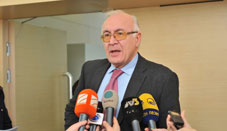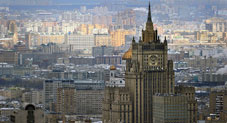
Russia erecting more banners
By Gvantsa Gabekhadze
Wednesday, July 12
Georgia’s Special Envoy to Russia, Zurab Abashidze, says the main reason why Russia continues its creeping occupation on Georgian soil and erecting new banners is to force Georgia to recognize its occupied regions of Abkhazia and Tskhinvali (South Ossetia) as independent republics.
“The erection of barriers at the occupation line and generally what is happening there is all aimed at forcing us to start talks with the Ossetian de-facto government about the demarcation of the so-called border, which is absolutely unacceptable,” Abashidze said.
He stressed it is necessary for this process to be over.
"We cannot start negotiations with the de facto authorities. We will try our best to end this process and solve this problem with the help of the international community and western partners,” Abashidze said.
He stressed the Georgian government is trying to do this in “an everyday manner”.
“80 percent of our foreign policy efforts are aimed at resolving this grave problem," Abashidze stated.
Meanwhile, Russia’s Foreign Minister Sergey Lavrov stated that Russia and South Ossetia “are concerned” about the unstable situation in ‘Transcaucasia’, which they claim is provoked, among other factors, by Georgia's attempts to join NATO.
“In this way, NATO wants to strengthen its position in the region. Therefore, it is necessary for Russia to cooperate with South Ossetia and of course, with our Abkhaz allies,” Sergey Lavrov said.
Lavrov stated Russia would continue to ‘neutralize threats to peace and stability’.
"We believe that the most important place for these efforts is the Geneva Talks, where we have the main task of signing an agreement on the non-use of force," Lavrov added.
Russia recognized two Georgian regions as independent republics (which constitute 20 percent of Georgia’s total land), in the wake of the Russia-Georgia war in 2008.
Only Russia, Venezuela, Nicaragua and Nauru recognize the two regions as independent republics.
The Geneva Talks were established after the August 2008 war in order to address the consequences of the Russia-Georgia clash.
The meeting is co-chaired by representatives from the European Union (EU), the United Nations (UN) and the Organisation for Security and Co-operation in Europe (OSCE), while negotiators from Georgia, Russia and the United States, as well as from Georgia’s breakaway regions are also involved.


